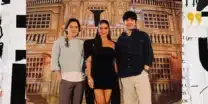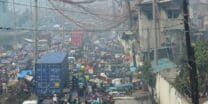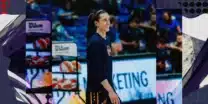PLASTIC pollution is a major environmental issue that the world has been dealing with for decades.
According to the United Nations, there are 400 million tons of plastic being produced every year, one-third of which is only used once. Over 2,000 garbage trucks of plastic go to oceans, rivers and lakes.
This synthetic material does not only affect the environment but also living species, as microplastics can mix in with their food and drinks, and even in the air that they are breathing.
Given this situation, is it impossible to achieve a world free of plastic pollution? Not if you ask for-profit social enterprise Plastic Bank.
Money in garbage
Plastic Bank is proof that there is money in garbage.
With a vision to have “a wasteless world,” this social enterprise’s advocacy is to stop plastic pollution in the oceans while empowering its members to rise out of poverty.
Plastic Bank has been working with countries with high rates of plastic pollution and poverty, one of which is the Philippines.
At present, there are some 7,800 Filipinos who are collection members of Plastic Bank.
Under its program, its members collect plastic waste from the bay or sea and bring these to collection branches of the social enterprise to exchange these for money or other life-improving benefits.
Every 10 kilograms of plastic collected is equivalent to $5 or P283. The collection members use this money to buy their everyday necessities like food.
Aside from this, Plastic Bank’s program also allows the members to access health, work and life insurance, and digital connectivity benefits.
As for the collected plastic, these are brought to Plastic Bank’s processing partners to be reintegrated into new products and packaging.
Plastic Bank founder David Katz told republicasia that the group’s task is to express and exhibit the value of the plastic back into the product. A plastic bottle or package can be even more expensive than the product inside it, said Katz.
“The material itself [is] of high value, high recyclability, and high reuse, and high demand. Plastic Bank is creating the process to have every piece of packaging reveal its value,” Katz said.
“It provides a space for anyone who encounters it. The ability to collect and exchange it like money,” he added.
‘A world without waste’
With Plastic Bank, Katz envisions a world where there will be no waste.
He has had this picture in his mind ever since he stood at Ocean Park back in May 2013.
“It’s what I saw at the ocean’s floor that moved me and inspired me so much that I knew something had to occur, recognizing that most plastics sank,” the founder said.
“And what we saw on the top was just a fraction of what lies below. That’s what pushed me, knowing that something needed to be done,” he added.
Through his advocacy of fighting plastic pollution and poverty, he hopes to give a voice to those who have none, whether they’re living underwater or on land.
He also said he aims to use this environmental catastrophe to solve the real global challenge, which is poverty.
“20 percent of [the] Filipino community still lies below the international poverty line. We’re not going to solve the issue with [the] environment until we solve the issue with poverty,” he stressed.
He also said the plastic pollution problem continues because of people’s short-term thinking. He wants to break away from this.
He has begun this journey with Plastic Bank, making the effort to build a world with no waste and where all materials are returned to circularity.
Plastic pollution in PH
The plastic pollution problem in the Philippines is dire.
In its March 2023 article, Plastic Bank cited a 2021 study by Science Advances which found that the Philippines led the list of the top 10 ocean plastic contributors, generating an estimated 356,371 metric tons of plastic waste.
The country was followed by India (126,513 MT), Malaysia (73,098 MT), China (70,707 MT), Indonesia (56,333 MT), Myanmar (40,000 MT), Brazil (37,799 MT), Vietnam (28,211 MT), Bangladesh (24,640 MT), and Thailand (22,806 MT).
Katz said there has been an improvement in the Philippines, but much still needs to be done because the “sachet economy” in the country remains widespread. Sachet economy refers to products that are sold in small quantities at a more affordable price.
“The Philippines is still heavily invested in the sachet economy, where single-use material that is not recyclable, that’s not reusable, is still being produced in billions of units per year. And that responsibility, I believe, lies on the producer,” he said.
In June 2023, the Department of Environment and Natural Resources called for the integration of the informal waste sector into the expanded producer responsibility (EPR) system for plastic packaging waste to improve waste management. This will include waste pickers in dumpsites and communal waste collection points.
Environment Secretary Antonia Loyzaga highlighted the importance of having an informal waste sector, saying that their collection and sorting facilities may be turned into formal activities and establishments which could also become business partners.
Katz also commended the Philippine government for the passing of the Republic Act 11898 or the EPR Act of 2022. The law requires producers to be responsible for their product’s entire life cycle.
“Plastic Bank is working on that area, in this EPR legislation, to create a space for the authentic, transparent collection of those materials. Laws instilled by governments have a tremendous opportunity to affect change locally,” he said.
Buying is voting
Katz also acknowledged the youth’s participation in the campaign against plastic pollution.
The most notable characteristic of the new generation, he said, is that they recognize what would be the effect of products they’re purchasing.
People need to understand that when they buy a product with excessive packaging that would contribute to the sachet economy, the cycle would continue, he said.
“You have to recognize that when you buy something, they’re going to produce it again. Every time you buy, you vote,” he said.
Capture moments of joy
Katz is currently in the Philippines to visit recycling communities from August 15 to 17.
During his three-day visit, the Plastic Bank founder said he would surely “capture moments of joy” of the group’s collection members, as the social enterprise would give them support that will allow them to pursue their plans for themselves and for their families.
“We’re gonna share it with the world [so] that everybody can experience that moment of transformation, that moment of joy. To see what [it’s] like to give and to receive,” he said.









